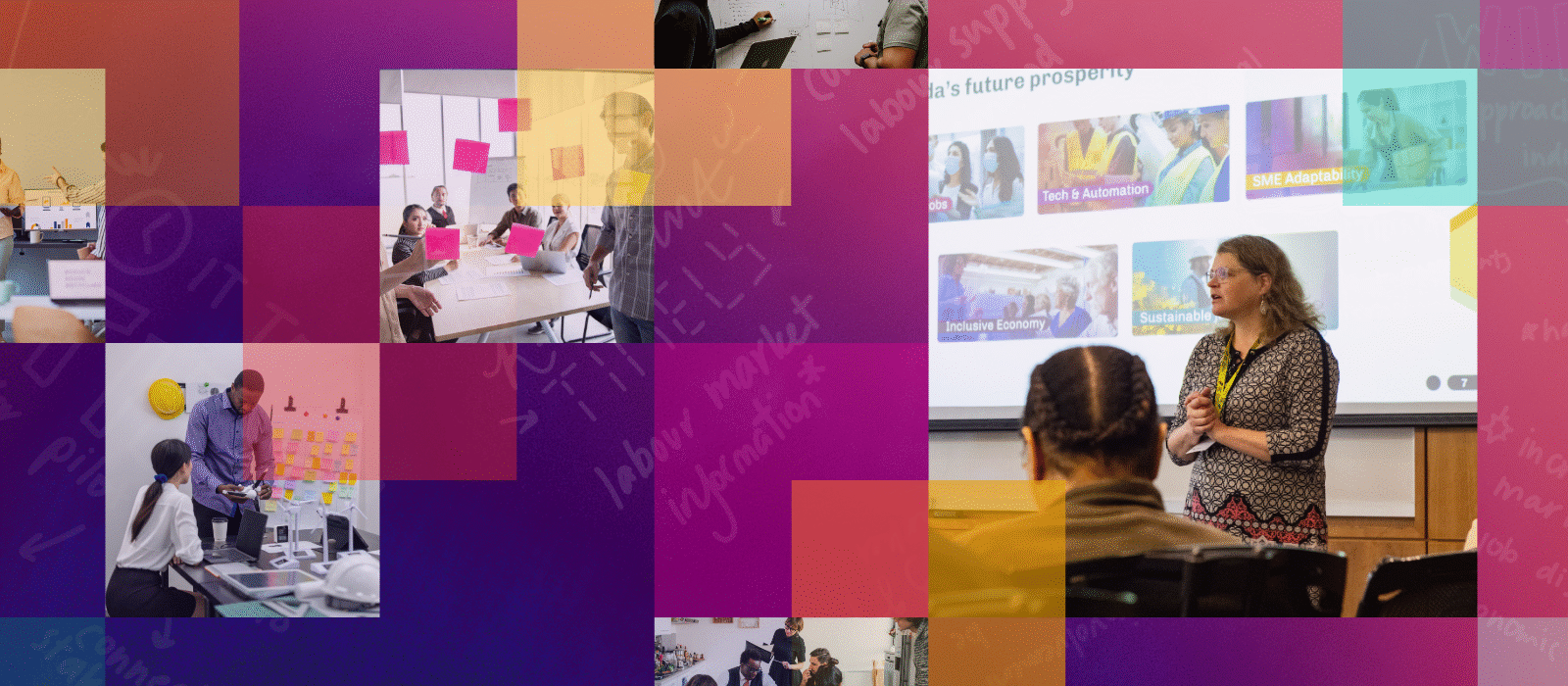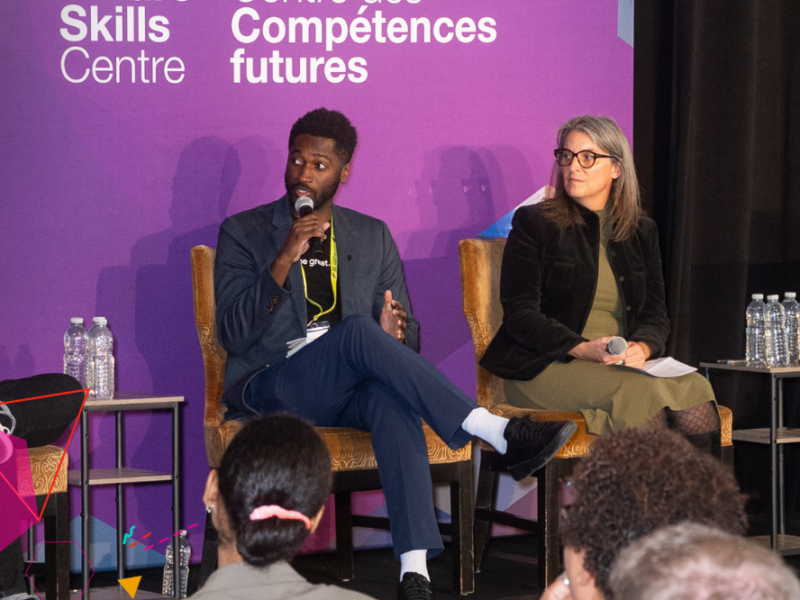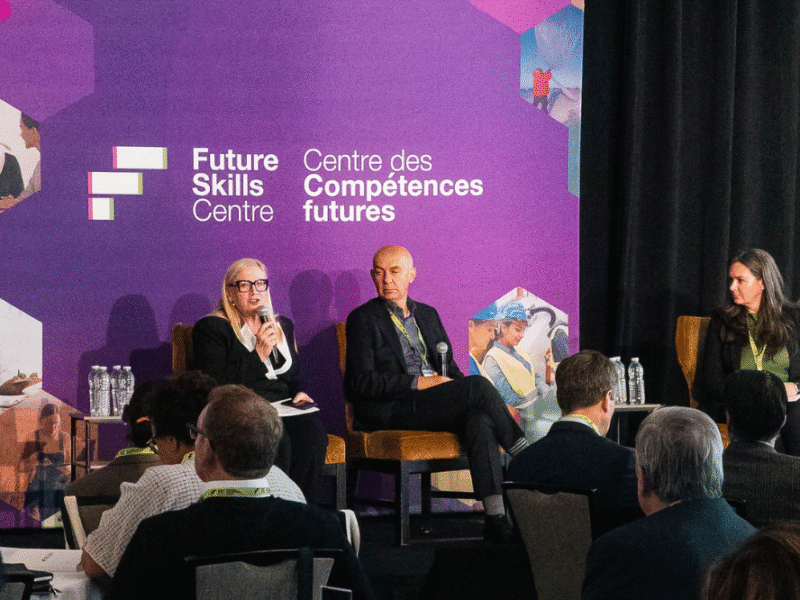Embracing Evaluation and Learning for a Resilient Future

What if the key to preparing Canada’s workforce wasn’t just about training people but learning from the training itself?
We’ve spent nearly six years invested in close to 400 projects and engaged with thousands of experts, educators and workers to uncover what truly moves the needle in skills development. Innovation relies on understanding what works, what doesn’t and how we can do better.
Our State of Skills Report explores the biggest shifts in Canada’s workforce, from emerging job trends to system-wide challenges. As we navigate this transformation, evaluation and learning have never been more important. By tracking outcomes, embracing new methodologies and fostering open dialogue, we’re ensuring that every insight gained fuels smarter decisions and stronger policies for the future of work.
The Role of Evaluation in Driving Innovation
Evaluation and learning are at the core of our work, helping us understand what strategies are effective and where improvements are needed. Initially, the Future Skills Centre’s approach focused on standardizing measurements for comparability, particularly in socio-demographic data and employment outcomes. While standardization remains valuable (and we do as much of it as possible), we have expanded our evaluation framework to incorporate participant experiences, results on the organization-level and processes, and broader system-level impacts.
One of the biggest lessons we have learned is that not all interventions fit neatly into traditional intervention and evaluation models. While directly training participants is a feature of many projects, we’re increasingly looking to address systemic issues and root causes of skills shortages. This has led to an expansion of the kinds of interventions we invest in—developing curricula, adjusting recruitment processes or fostering network alliances, for example. Measuring the success of these initiatives requires a more nuanced and flexible approach.
To strengthen our evaluation capacity, we have:
- partnered with external evaluators who work directly with project teams to develop tailored evaluation plans;
- emphasized outcome-based assessment, looking beyond program completion rates to examine real results and long-term impact;
- encouraged a culture of learning where challenges and setbacks are openly discussed as part of the innovation process.
Embracing a Learning Mindset
One of the most significant barriers to meaningful evaluation is the reluctance to discuss what does not work. In the private sector, failure is often seen as an inevitable part of innovation. No one expects a founder to grow a successful business on their first attempt. However, in social innovation and publicly funded initiatives, there is a tendency to highlight only successes. At the Future Skills Centre, we believe that true learning comes from a balanced perspective—celebrating innovation that has the desired impact but also digging in to understand what doesn’t work and why.
By fostering open dialogue and investing in rigorous evaluation, we are not only improving our programs but also contributing to a broader ecosystem of knowledge. Organizations with strong evaluation frameworks—such as those working with our partners at Blueprint and the Diversity Institute—have provided critical insights that enhance the quality of our work.
We also recognize the importance of diverse evaluation methodologies, including Indigenous-led frameworks that prioritize relationships, community engagement and holistic measures of success. These approaches enrich our understanding and ensure that evaluation is inclusive of multiple perspectives and ways of knowing.
Looking Ahead
Evaluation and learning are not just about measuring success; they are about continuously improving our approach to skills development. By embracing a culture of curiosity, openness and adaptability, we can better equip Canada’s workforce for the challenges and opportunities ahead.
Moving forward, we aim to deepen our understanding of what works, scale effective approaches and share actionable insights that drive policy and program innovation. This means strengthening data-driven decision-making, investing in our partners and continuing to explore diverse methodologies—including Indigenous-led approaches that centre community and relationships.
For a deeper dive into our learning journey and key takeaways, watch our webinar recording. The session features our presentation on the State of Skills alongside insights from two of our evaluation partners—one discussing evaluation practices across multiple projects and another focusing on Indigenous-led evaluation approaches.
We invite all stakeholders, employers, policymakers, educators and learners to engage with our research, share their insights and join us in building a more resilient and inclusive future of work. Visit the Future Skills Centre website to learn more.
This blog is based on a speech delivered by Tricia Williams at the Innovating for Impact: Evaluation and Learning in Canada’s Skills Ecosystem event and was refined using AI-assisted transcription and drafting tools. The final version has been reviewed for accuracy.
The views, thoughts and opinions expressed here are the author’s own and do not necessarily reflect the viewpoint, official policy or position of the Future Skills Centre or any of its staff members or consortium partners.




